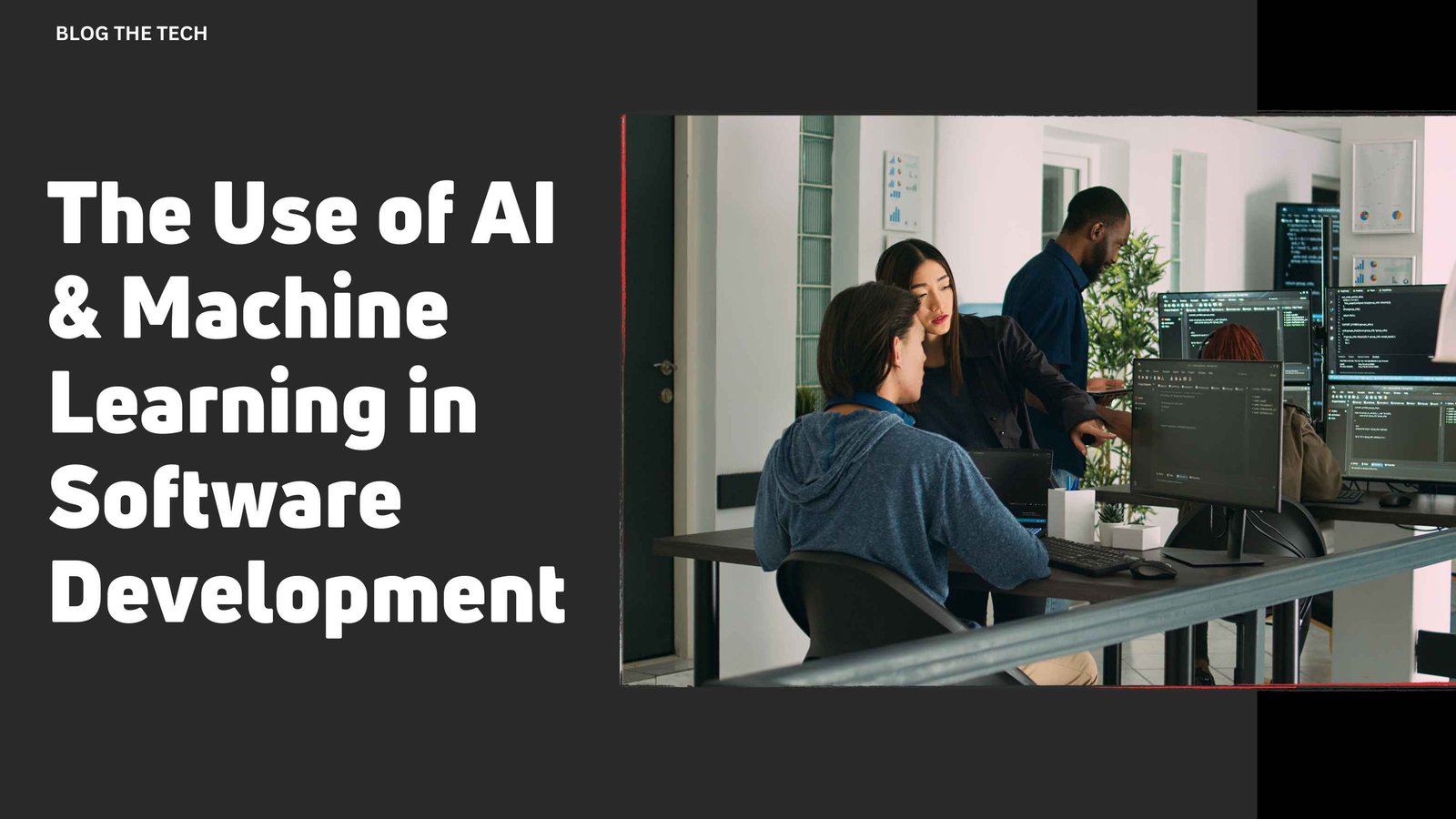This article explores the role of Artificial Intelligence (AI) and Machine Learning (ML) in software development. It explains how AI encompasses intelligent machine capabilities, while ML involves training machines through data.
The article highlights key applications of AI and ML in software development, including automated testing, bug detection, predictive maintenance, code generation, natural language processing (NLP), and personalized experiences. It emphasizes the potential of these technologies to enhance efficiency, accuracy, and creativity in software development, inviting readers to embrace and leverage their capabilities.

Software development is an ever-evolving field, with new technologies emerging constantly. One such technology that has shaken up the world of software is Artificial Intelligence (AI). From automating mundane tasks to predicting user behavior, AI and machine learning (ML) have become integral to this industry.
Keeping up with the latest technological advancements can be challenging, but we’re here to help! Read on to learn more about the role of AI and ML in software development.
Understanding Artificial Intelligence and Machine Learning

In simple terms, AI is the broader concept of developing intelligent machines that can perform human-like tasks, while machine learning is a specific approach or technique within AI that involves training machines to learn from data.
AI refers to the ability of machines to perform tasks typically requiring human-like intelligence and involves developing algorithms and computer programs that simulate human intelligence and behavior. AI technology is designed to perform tasks such as speech recognition, decision-making, and understanding natural language.
Machine learning is a subset of AI that uses statistical techniques that enable machines to learn from data without being explicitly programmed. It involves building models and algorithms to analyze data, identify patterns, and make predictions or decisions based on that data.
As more and more businesses turn to these technologies to improve their processes and outcomes, now is a great time to consider the role of offshore companies in this field. If you’re looking to outsource your software development needs, be sure to check these top offshore companies using AI and machine learning to drive innovation and efficiency.
They have the expertise and resources to deliver high-quality software solutions and help your business stay ahead of the curve in today’s competitive marketplace.
The Role of AI and Machine Learning in Optimizing Software Development
AI and machine learning are increasingly used to automate repetitive tasks, reduce errors, and improve the quality of software products.
Let’s take a more in-depth look at specific use cases:
1. Automated Testing

AI enables developers to test their code more thoroughly and efficiently. AI-powered testing tools can simulate a wide range of user behaviors and identify potential issues in real-time.
These tools can also learn from past testing results to improve future tests, leading to more accurate and reliable testing over time. With AI and ML-powered testing, developers can save time and resources that would otherwise be spent on manual testing and validation.
2. Bug Detection
Traditional bug detection methods, such as manual code reviews, are time-consuming and prone to human error. AI algorithms can analyze code and help developers quickly and accurately identify bugs and errors that manual reviews may have missed.
3. Predictive Maintenance
Predictive maintenance is the practice of using data analytics and algorithms to predict when software systems may be due for upgrades and maintenance.
By analyzing data from software systems, such as performance metrics, error logs, and usage patterns, AI algorithms can identify signs indicating impending failure or degradation of system components. This allows developers to take proactive measures, prevent downtime and reduce maintenance costs.
4. Code Generation

With the help of AI, developers can generate some code automatically and significantly reduce the time and effort required to create software. AI algorithms can analyze vast amounts of code and use that knowledge to generate new code that meets specific requirements.
Code generation can be applied to a wide range of software development tasks, from creating basic programs to developing complex applications. With AI-generated code, such as the solutions provided by Zencoder, developers can streamline the development process, reduce the number of errors, and improve the overall quality of the software they produce.
5. Natural Language Processing
AI/ML algorithms are used to develop natural language processing (NLP) systems that can analyze and interpret human language, including written and spoken language.
These algorithms can be trained on large datasets of human language, allowing them to learn how to recognize and respond to patterns in human speech. Once trained, NLP systems can be used to develop chatbots and other conversational interfaces that can interact with users in natural language.
These conversational tools be used for a wide range of applications, from customer support and sales to virtual assistants and personal productivity tools. For example, voice-activated virtual assistants like Amazon’s Alexa, Apple’s Siri, and Google Assistant are increasingly used in homes and offices, providing hands-free control over everything from lights and thermostats to music and news.
By leveraging AI-powered NLP systems, chatbots can provide quick and accurate responses to user queries, improving the overall user experience and reducing the need for human intervention.
5. Personalization

Machine learning algorithms can analyze large datasets of user behavior, including browsing history, purchase history, and other interactions with software applications. This analysis can reveal patterns and trends that can be used to create personalized experiences for individual users.
For example, AI algorithms can analyze users’ search history to recommend products or services relevant to their interests. They can also analyze a user’s behavior within a software application to personalize the user interface, making it more intuitive and easier to use.
In addition, AI-powered personalization can improve user engagement by tailoring content and experiences to their preferences. This can include personalized recommendations, content filtering, and targeted marketing campaigns.
Dive Into the Amazing World of AI and Discover New Potential for Software Development
Artificial intelligence has long been viewed with a sense of awe and fear by the general public. It might seem scary or complicated to understand. But ultimately, AI is a powerful tool, and it’s up to humans to decide how to use it.
The real promise of AI lies in its ability to automate tedious tasks and help humans become more productive and creative. In the field of software development, AI can take care of repetitive, time-consuming chores, allowing developers to focus on more meaningful aspects of engineering, such as innovation and creative problem-solving.
As we continue to push the boundaries of AI research and development, we can expect to see even more innovative and exciting applications emerge in the coming years. So, why wait any longer? Join the hype train, harness the potential of this amazing technology, and unlock a world of possibilities!



